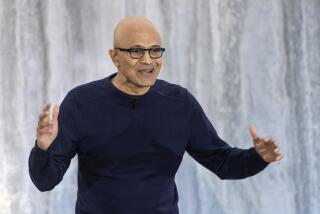Stars align for a Microsoft ‘Star Trek’ marketing deal
- Share via
Microsoft Corp. is partnering with Paramount Pictures on a promotional effort for the studio’s “Star Trek Into Darkness.” It represents the biggest such undertaking ever for the software giant.
The Redmond, Wash., company’s campaign isn’t short on whimsy: Bing, Microsoft’s Internet search engine, was updated Tuesday to include the “Star Trek” language Klingon in its online translation service.
But there also is strategic significance to the marketing venture, because it leverages so many Microsoft services, devices and platforms in a way not previously attempted by the company for a movie promotion.
PHOTOS: Tech we want to see in 2013
Other elements include a “Star Trek” application for new smartphones and computers that run Windows 8 software, promotional events at Microsoft Store locations, significant advertising on the MSN website and the release of a new video game for Xbox 360 and Windows PCs.
Shawn Sanford, senior director of lifestyle marketing for Microsoft, said that the company had been previously open to the idea of such a comprehensive partnership with a movie studio, but couldn’t find the right project.
“This one lined up really, really well. The stars aligned,” he said, noting that the “Star Trek” franchise resonates with many people who work at Microsoft. Indeed, Bing developed the translator with help from Microsoft engineer Eric Andeen, one of the few people in the world who speaks Klingon.
J.J. Abrams’ “Star Trek Into Darkness” debuted overseas last weekend in seven territories and grossed $31.7 million. The movie opens domestically Thursday.
The effort could help Microsoft change its image, experts who follow the company say.
Tim Bajarin, a longtime Microsoft analyst, noted that the “PC has aged and is no longer considered hip,” leading to an “old school” image for Microsoft. The “Star Trek” partnership could change that.
“[It] is a serious attempt to try and make Microsoft relevant again and get their brand and products back into the thinking of consumers,” said Bajarin, president of Creative Strategies Inc., in an email. The effort could help Microsoft raise awareness of new products like the Surface tablet and the Windows 8 smartphone, he said.
PHOTO GALLERY: The Billion Dollar Box Office Club
The partnership does not include a product placement deal. Instead, it involves Microsoft incorporating intellectual property from the “Star Trek” movie into various products and services, ultimately promoting the film in forums and venues that Paramount would not normally target. In return, Paramount has made “Star Trek” marketing materials available to Microsoft for its promotional efforts.
Microsoft and Paramount declined to discuss the financial details of their deal.
LeeAnne Stables, executive vice president of worldwide marketing partnerships for Paramount, said that the partnership began to take shape after Microsoft executives met with studio brass in December in Los Angeles. Stables said that Microsoft’s portfolio of technology products and services made it an appropriate partner on “Star Trek Into Darkness,” which is set in the 23rd century. “A tech company was high on our list,” she said.
Film industry veteran Russell Schwartz, the former president of theatrical marketing for New Line Cinema, said the partnership should help Microsoft “in terms of getting into the pop culture. This is certainly a great movie to attach themselves to.”
Paul Saffo, a San Francisco-based technology forecaster, said that with the slow sales of the Windows 8 operating system — which was released last year and has sold more than 100 million licenses, on par with sales for Windows 7 — Microsoft has a “very serious coolness problem right now.”
It could be trying to correct that with the “Star Trek” partnership. But Saffo questioned Microsoft’s approach.
“There is nothing subtle about putting Klingon in the Bing translator,” said Saffo, a managing director at research firm Discern Analytics. “Microsoft has always had the tendency to overdo it. No one is going to switch to Bing because there is Klingon on it.”
This post has been updated to reflect new information provided by Microsoft. An earlier version said that the company had sold more than 60 million licenses for Windows 8.
More to Read
From the Oscars to the Emmys.
Get the Envelope newsletter for exclusive awards season coverage, behind-the-scenes stories from the Envelope podcast and columnist Glenn Whipp’s must-read analysis.
You may occasionally receive promotional content from the Los Angeles Times.











